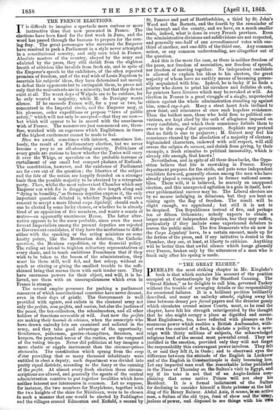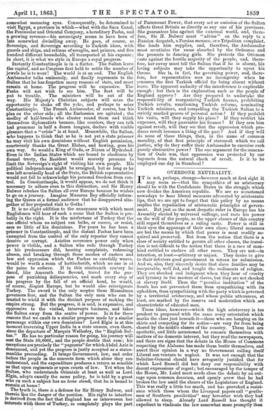"THE GREAT ELCHEE."
PERHAPS the most striking chapter in Mr. Kinglake's book is that which contains his account of the position occupied at Constantinople by Sir Stratford Canning. The "Great Elchee," as he delights to call him, governed Turkey without the trouble of arranging details or the responsibility for occasional failures. It is a brilliant position brilliantly described, and many an unlucky attache, sighing away his time between dreary pro forma' papers and the drearier gossip which circulates around minor Courts, must, as he read the chapter, have felt his strength reinvigorated by the thought that he also might occupy a place so dignified and serene. Most Englishmen, too, have reflected with pleasure on the enormous power which enables a British Ambassador, with- out even the control of a fleet, to dictate a policy to a sove- reign with thirty millions of subjects, the acknowledged religious head of the second most powerful creed. They are justified in the emotion, provided only they will not forget the responsibility this extravagant power involves. They felt it, or said they felt it, in Gude ; and to observant eyes the difference between the attitude of the English in Lucknow and of the English in Constantinople is daily becoming less. Let any impartial man read the remarkable letter published in the Times of Thursday on the Sultan's visit to Egypt, and say if its tone is not that of an Anglo-Indian com- plaining that some native Prince will not obey his Resident. It is a formal indictment of the Sultan for deelini g to consider himself a State prisoner at the bid ding of Sir Henry Bulwer. Abdul Aziz, it seems, is an active man, a Sultan of the old type, fond of show and the army, jealous of power, and disposed to see things with his own somewhat menacing eyes. Consequently, he determined to visit Egypt, a province in which—what with the Suez Canal, the Peninsular and Oriental Company, a hereditary Pasha, and a growing revenue—his sovereignty seems to have been of late somewhat dwindling away. He goes, of course, as Sovereign, and Sovereign according to Turkish ideas, with guards and ships, and retinue of seraglio, and princes, and five hundred different households, all transported at his expense ; in short, it is what we style in Europe a royal progress.
Instantly Constantinople is in a flutter. The Sultan leave the capital, and no Congress first held to settle the number of jewels he is to wear ! The world is at an end. The English Ambassador talks ominously, and finally represents to the Sultan that he has forgotten many reasons of state, and must remain at home. The progress will be expensive. The Pasha will not wish to see him. The fleet will be put to trouble. The ministers will be out of the way. His Majesty's Christian subjects will seize the opportunity to shake off the yoke, and perhaps to seize Constantinople. The French Ambassador, of course, has his plea on the other side ; all the Embassies are agitated ; the medley of half-breeds who cluster round them and think themselves diplomatists because, like couriers, they can talk bad grammar in half a dozen tongues, declare with visible pleasure that a "crisis" is at hand. Meanwhile the Sultan, who happens to think that as he is not yet a state prisoner he may visit his own dominions without English permission, 'courteously thanks the Great Elchee, and bowing, goes his own way. So would a King of Oude, or Nizam of Hydraba.d. Even in the Indian States which are bound to obedience by formal treaty, the Resident would scarcely presume to limit the Sovereign's right of visiting his own people. His political independence might be arraigned, but so long as he was left nominally head of the State, the British representative would not fail to acknowledge his personal freedom from con- trol. In Constantinople, it would appear, we do not think it necessary to adhere even to this distinction, and Sir Henry Bulwer rebukes the Sultan all over Europe because he wishes to go on a journey. Imagine Musurus Bey officially inform- ing the Queen at a formal audience that he disapproved alto- gether of her projected visit to Gotha! It is no slight addition to the annoyance with which most Englishmen will hear of such a scene that the Sultan is pro- bably in the right. It is the misfortune of Turkey that the one official whom no subject can bribe, or coerce, or resist, sees so little of his dominions. For years be has been a prisoner in Constantinople, and the distant Pashas have been exempted from the control of the only reporter they cannot deceive or corrupt. Asiatics reverence power only when power is visible, and a Sultan who rode through Turkey as his predecessors did, hearing complaints, redressing abuses, and breaking through those meshes of custom and Jaw and oppression which the Pashas so carefully weave, would be worth a ream of hattischerifs, which no one is at the pains to enforce. If in this nineteenth century he dared, like Amurath the Second, travel for the pur- pose of punishing delinquencies, and mark every step of Ins progress by the fall of an official head, he would, of course, disgust Europe, but he would also reinvigorate Turkey. The sword is the only sceptre these Musstdman governors fear, and the Sultan the only man who can be trusted to wield it with the distinct purpose of making the empire strong. But the progress, it is said, is expensive, and oppressive to the visited, interrupts business, and takes the Sultan away from the centre of power. Is it for those reasons that we exult in a similar progress made by a similar personage within our own dominions? Lord Elgin is at this moment traversing Upper India in a state unseen, even there, since the departure of Marquis Wellesley, the "English Sul- tan." He has no particular reason for going, his journey will eost the State 50,000/., and the people double that sum; • his receptions are precisely the "pageants" for whiehAbdul Aziz is denounced, and yet the progress is justly accepted as a states- manlike proceeding. It brings Government, law, and order before the people in the concrete form which alone they can understand, and the expenditure produces a return as sensible as that upon regiments or upon courts of law. Yet when the Sultan' who understands Orientals at least as well as Lord Elgin, adopts exactly the same policy, he is told by a guest who on such a subject has no locus standi, that he is bound to remain at home The truth is, there is a defence for Sir Henry Bulwer, and therein lies the danger of the position. His right to interfere is derived from the fact that England has so interwoven her interests with those of Turkey, so completely plays the part of Paramount Power, that every act or omission of the Sultan affects Great Britain as directly as any one of his provinces. She guarantees him against the external world, and, there- fore, Sir H. Bulwer must "advise" on the reply to a Russian despatch, a Persian menace, or a Tripolitan complaint. She lends him supplies, and, therefore, the Ambassador must scrutinize the sums absorbed by the Ordnance and the presents to dancing girls. She protects the Ottoman caste against the hostile majority of the people, and, there- fore, her envoy must tell the Sultan that if he is absent, his loving subjects may take the opportunity to upset his throne. She is, in fact, the governing power, and, there- fore, her representative sees no incongruity when he censures the first Turkish official for being absent without leave. The apparent audacity of the interference is explicable enough ; but then is the explanation such as the people of England approve ? Are they prepared to undertake the responsibility of reorganizing Turkish finance, prohibiting Turkish revolts, sanctioning Turkish reforms, nominating Turkish ministers, and compelling the Turkish Sultan to a strictly marked groove of personal action ? If they prohibit his visits, will they supply his place? If they restrict his expenses, will they guarantee his finance ? If they arm him against revolt, will they see that the oppression which pro- duces revolt becomes a thing of the past ? And if they will do none of these things, then, in the name of common morality, of that first principle of statecraft which we call justice, why do they suffer their Ambassador to exercise such purely obstructive power? The one argument for the annexa- tion of Oude was, that oppression was protected by our bayonets from the natural check of revolt. Is it to be employed one day in Stamboul ?































 Previous page
Previous page